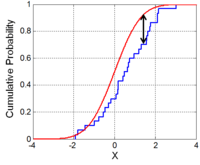
How Should Clinicians Respond to Race-Based Algorithms as Sources of Iatrogenic Harm?
Sign Up to like & getrecommendations! Published in 2022 at "AMA journal of ethics"
DOI: 10.1001/amajethics.2022.720
Abstract: Some clinical algorithms use race as an epidemiological shorthand to "correct" for health determinants that are clinically influential but also variable because they are historical, social, cultural, or economic in origin. Such "correction factors" are… read more here.
Keywords: sources iatrogenic; race based; race; based algorithms ... See more keywords

Promising insights in parallel grid‐based algorithms for quantum chemical topology
Sign Up to like & getrecommendations! Published in 2023 at "Journal of Computational Chemistry"
DOI: 10.1002/jcc.27105
Abstract: Some straightforward improvements designed to make grid‐based quantum chemical topology more efficient and faster are presented. The strategy focuses on both the evaluation of the scalar function over three‐dimensional discrete grids and the algorithms aimed… read more here.
Keywords: topology; promising insights; chemical topology; based algorithms ... See more keywords

Validation of claims‐based algorithms to identify patients with psoriasis
Sign Up to like & getrecommendations! Published in 2021 at "Pharmacoepidemiology and Drug Safety"
DOI: 10.1002/pds.5229
Abstract: Accurately identifying patients with psoriasis (PsO) is crucial for generating real‐world evidence on PsO disease course and treatment utilization. read more here.
Keywords: claims based; patients psoriasis; algorithms identify; based algorithms ... See more keywords

Performance characteristics of code‐based algorithms to identify urinary tract infections in large United States administrative claims databases
Sign Up to like & getrecommendations! Published in 2022 at "Pharmacoepidemiology and Drug Safety"
DOI: 10.1002/pds.5492
Abstract: In real‐world evidence research, reliability of coding in healthcare databases dictates the accuracy of code‐based algorithms in identifying conditions such as urinary tract infection (UTI). This study evaluates the performance characteristics of code‐based algorithms to… read more here.
Keywords: urinary tract; characteristics code; code based; algorithms identify ... See more keywords

Development and performance characteristics of novel code‐based algorithms to identify invasive Escherichia coli disease
Sign Up to like & getrecommendations! Published in 2022 at "Pharmacoepidemiology and Drug Safety"
DOI: 10.1002/pds.5505
Abstract: Evaluation of novel code‐based algorithms to identify invasive Escherichia coli disease (IED) among patients in healthcare databases. read more here.
Keywords: novel code; invasive escherichia; code based; algorithms identify ... See more keywords

Validation of claims‐based algorithms to identify non‐live birth outcomes
Sign Up to like & getrecommendations! Published in 2022 at "Pharmacoepidemiology and Drug Safety"
DOI: 10.1002/pds.5574
Abstract: Perinatal epidemiology studies using healthcare utilization databases are often restricted to live births, largely due to the lack of established algorithms to identify non‐live births. The study objective was to develop and validate claims‐based algorithms… read more here.
Keywords: live births; algorithms identify; claims based; based algorithms ... See more keywords

Lower Bounds on the Runtime of Crossover-Based Algorithms via Decoupling and Family Graphs
Sign Up to like & getrecommendations! Published in 2021 at "Algorithmica"
DOI: 10.1007/s00453-020-00776-6
Abstract: The runtime analysis of evolutionary algorithms using crossover as search operator has recently produced remarkable results indicating benefits and drawbacks of crossover and illustrating its working principles. Virtually all these results are restricted to upper… read more here.
Keywords: crossover; family; based algorithms; crossover based ... See more keywords

Discretization-based algorithms for generalized semi-infinite and bilevel programs with coupling equality constraints
Sign Up to like & getrecommendations! Published in 2019 at "Journal of Global Optimization"
DOI: 10.1007/s10898-019-00764-3
Abstract: Discretization-based algorithms are proposed for the global solution of mixed-integer nonlinear generalized semi-infinite (GSIP) and bilevel (BLP) programs with lower-level equality constraints coupling the lower and upper level. The algorithms are extensions, respectively, of the… read more here.
Keywords: equality; level; discretization based; equality constraints ... See more keywords

Comparative analysis of machine learning and point-based algorithms for detecting 3D changes in buildings over time using bi-temporal lidar data
Sign Up to like & getrecommendations! Published in 2019 at "Automation in Construction"
DOI: 10.1016/j.autcon.2019.102841
Abstract: Abstract Building Change Detection techniques are critical for monitoring building changes and deformations, construction progress tracking, structural deflections and disaster management. However, the performance of relevant algorithms on airborne light detection and ranging (lidar) data… read more here.
Keywords: change detection; point; point based; detection ... See more keywords

A Fast and Efficient Algorithm for Mining Top-k Nodes in Complex Networks
Sign Up to like & getrecommendations! Published in 2017 at "Scientific Reports"
DOI: 10.1038/srep43330
Abstract: One of the key problems in social network analysis is influence maximization, which has great significance both in theory and practical applications. Given a complex network and a positive integer k, and asks the k… read more here.
Keywords: algorithm; based algorithms; propagation based; topology ... See more keywords

Using transfer-learning-based algorithms as data reduction strategies for volatile organic compounds classification using plasma spectroscopy
Sign Up to like & getrecommendations! Published in 2023 at "Journal of Physics D: Applied Physics"
DOI: 10.1088/1361-6463/accbcc
Abstract: This work presents the use of transfer-learning-based algorithms as data reduction strategies for the classification of volatile organic compounds (VOCs) using the optical emission spectroscopy of plasmas. The plasma used is generated with a home-made… read more here.
Keywords: transfer; physics; spectroscopy; transfer learning ... See more keywords